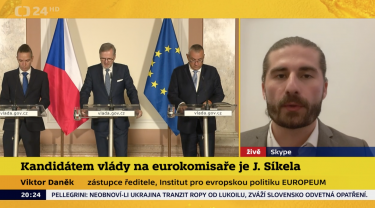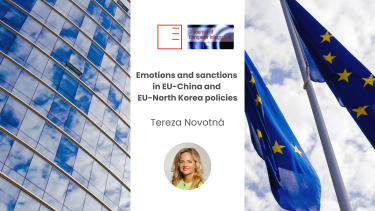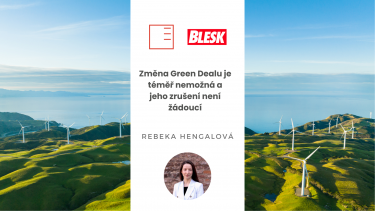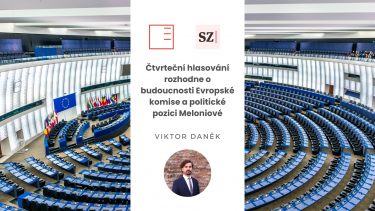e15 | European politicians boycott Hungarian presidency. Will Orbán continue to provoke?
Hungarian Prime Minister Viktor Orbán took over the EU Council presidency less than a month ago, but he has already managed to provoke the EU institutions and most member states with his unauthorized "peace" mission to Russia and China. During this mission, he presented himself as a representative of the European Union, despite having no authority to do so. European politicians have responded to this situation with initial retaliatory measures. How will Viktor Orbán proceed? What strategies and tactics might the Hungarian Prime Minister use during his presidency? Oszkár Roginer-Hofmeister, a research fellow at EUROPEUM Institute, commented on this for e15.
Show more
ČT24 | The Czech candidate for European Commissioner is Jozef Síkela
Jozef Síkela has been nominated by the Czech government for the position of European Commissioner. What was crucial for the decision? And why was Danuše Nerudová not nominated, even though Ursula von der Leyen requires both a female and male candidate? What is the timeline now? Viktor Daněk, Deputy Director of EUROPEUM Institute, answers these and other questions for ČT24.
Show moreJournal of European Integration | Emotions and sanctions in EU-China and EU-North Korea policies
Tereza Novotná, an Associate Research Fellow at the EUROPEUM Institute, explores the emotional dimensions of EU foreign policy in her article for the Journal of European Integration. The analysis examines how emotional factors shape political decisions and responses regarding EU human rights sanctions against China and North Korea, highlighting differing outcomes in these cases and suggesting that incorporating emotional awareness could enhance policy effectiveness.
Show more
The Diplomat | NATO's New Mission: Keep America Engaged, Russia in Check, and China Out
In an article for the international magazine The Diplomat, Tereza Novotná, an Associate Research Fellow at EUROPEUM Institute, analyzes NATO's new direction, focusing on the Indo-Pacific region. The alliance aims to keep American engagement, curb Russian aggression, and limit China's influence, with strengthening cooperation with partners like South Korea being crucial for ensuring global stability. The article also includes recommendations for enhancing these relationships.
Show more
Senior Researcher / Leader of a Research Programme
EUROPEUM Institute is currently looking for a Senior Researcher/Leader of a Research Programme for one of our work streams with a research focus on topics such as EU’s climate policy and decarbonization of industry, role of the EU as a global player, social dimension of EU regulatory framework, cohesion policy and/or MFF.
Show moreČTK | Commission President is assembling her team of commissioners, but so far has few candidates
After being approved by the European Parliament, European Commission President Ursula von der Leyen is starting to assemble her team of commissioners. Some countries have already submitted their candidates, but many are still pending, including the Czech Republic. In Czechia, discussions about potential candidates are ongoing, with additional names being proposed alongside those suggested by the STAN political party. Viktor Daněk, Deputy Director of EUROPEUM Institute, comments on the situation for Czech News Agency.
Show moreNovinky.cz | The number of migrants arriving in Europe has significantly decreased, with many heading to the Canary Islands
The European agency Frontex has released data on the number of migrants arriving in the European Union. This year, it recorded a third less migrants who have entered the Union illegally compared to last year. What are the reasons behind the decrease in migrant numbers? Did the failed agreement between the United Kingdom and Rwanda have an impact? Will the recently approved migration pact, which will come into effect in two years, also help? Viktor Daněk, Deputy Director of EUROPEUM Institute, commented on this for Novinky.cz.
Show moreBlesk.cz | Changing the Green Deal is almost impossible and its cancellation is not desirable
The Czech government's press conference on Wedesday was delayed by nearly two hours due to discussions on the giant nuclear tender for the completion of Dukovany. The originally planned approval of the Czech Green Deal was postponed. Prime Minister Fiala emphasized that no new commitments would be adopted and the government would seek to mitigate the impacts of previously approved measures. However, as noted by researcher Rebeka Hengalová from EUROPEUM Institute for Blesk.cz, altering the Green Deal is nearly impossible and canceling it is neither feasible nor desirable.
Show moreČT24 | Von der Leyen re-elected as president of the European Commission
Ursula von der Leyen has retained her position as President of the European Commission. She received a total of 401 votes, significantly exceeding the required majority of 361 votes. The result was not as close as expected. What ultimately helped her achieve victory? And how difficult was it for her to negotiate support? Deputy Director and Head of the Brussels Office of EUROPEUM Institute, Žiga Faktor, commented for ČT24.
Show more
Seznam Zprávy | Thursday's vote will decide the future of the European Commission and Meloni's political position
Thursday's vote will determine whether the current head will continue to lead the European Commission. However, it will also be pivotal for Italian Prime Minister Meloni. She must either join the majority or risk ending up on the sidelines. Viktor Daněk, Deputy Director of EUROPEUM Institute, provided a comment on her goals for Seznam Zprávy.
Show moreStaroměstské náměstí 4/1
Prague 1 - Staré Město
110 00
tel.: +420 212 246 552
email: europeum@europeum.org
https://www.europeum.org









